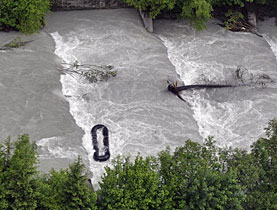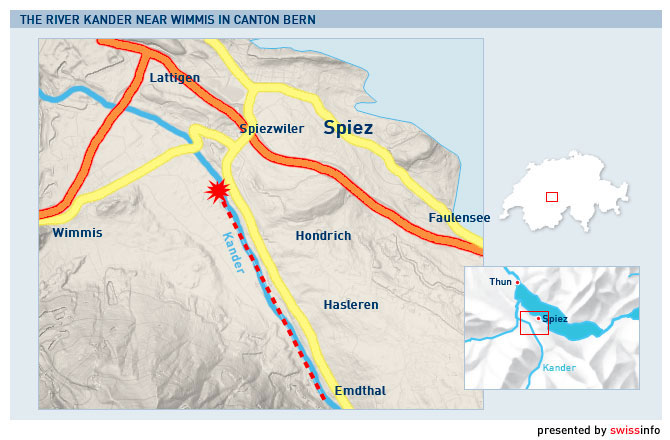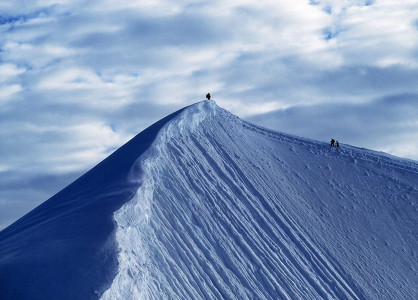Search continues after river accident

The search continues for two Swiss soldiers still missing after Thursday's rafting accident in the Bernese Oberland.
At least three soldiers died on Thursday in a military exercise on the River Kander near Wimmis. Five others were taken to hospital. Air force commander Walter Knutti said there was little hope that the missing men would be found alive.
The victims, aged between 25 and 33, all came from the German-speaking part of Switzerland.
“Despite our grief, we hope to be able to provide some explanations today,” Knutti told a media conference on Friday. But he warned that full details would not be available under the investigation was complete, which would take some time.
Of the five men taken to hospital after the accident, four were due to be released on Friday. The fifth was reported to be out of danger, but awaiting an operation on his jaw.
The injured men have already spoken to the police and documents have been taken for examination.
Army chief Roland Nef expressed his sorrow over the accident in an order of the day addressed to all serving troops. “Such a tragedy surpasses our understanding,” he said.
He called on troops to continue to carry out their tasks despite what had happened.
Murky river
The two dinghies which capsized are still in the water. Once it is possible to lift them out, they will be examined for clues, cantonal police spokesman Otto von Almen told journalists.
The Zurich cantonal police are due to join in on Saturday with underwater cameras.
The search is complicated by the fact that the river is particularly murky at the moment because of recent storms and because it is carrying glacier melt water, which is always opaque. It is also a river which carries a lot of debris.
About 80 troops and four police divers as well as helicopters are engaged in the search. However, the rescue dogs and thermal imaging cameras used initially have been stood down.
Hans Peter Luttenbacher of the Lake Thun lake police warned that the bodies could have been buried by rocks and if so, might never be found.
Accident conditions
The alarm was raised around 11.30am on Thursday. Two rubber dinghies overturned on the river, which was flowing at a rate – 40 cubic metres per second – that is considered unexceptional.
There were no storms in the area either that could have increased the flow according to the Swiss national weather service, Meteoswiss.
However, locals told swissinfo that water levels were high and that the stretch of river where the accident is believed to have taken place is graded as highly difficult for rafting. Commercial rafting is effectively banned there according to Swiss radio reports.
Speaking to journalists in the local town of Spiez on Thursday evening, Knutti said hat the three bodies that had been recovered were all wearing lifejackets and helmets.
Military spokesman Felix Endrich told swissinfo that the soldiers were on a refresher course.
The men were based in Wimmis for their course, but they are normally attached to the Alpnach airfield in canton Obwalden.
Defence Minister Samuel Schmid called off a planned trip to Brussels for a Nato meeting after hearing about the accident. Speaking in the capital Bern, he said he was dismayed and sad and that his thoughts went out to the soldiers’ families.
The speakers of the two chambers of parliament also expressed their condolences.
Past tragedies
The latest fatal incident involving the Swiss army follows the death in July 2007 of six mountain climbers who were hit by an avalanche on the southwest flank of the Jungfrau peak – Switzerland’s worst military accident for 15 years.
Questions were raised at the time about whether the army had underestimated the risks and the armed forces were severely criticised by the media.
Last October, the military justice launched a criminal investigation against two mountain guides. Scientific analysis had shown that the soldiers were most probably carried away by an avalanche they triggered themselves as they climbed towards the famous summit.
The army’s investigating judge said at the time that the guides’ decision to proceed with the climb was debatable given the conditions.
swissinfo
July 12, 2007: six recruits die in an avalanche on the Jungfrau in the Bernese Oberland, the worst accident in 15 years for the armed forces.
October 12, 2001: an Alouette III helicopter hits a cable near Crans-Montana in canton Valais and crashes, killing all four people on board.
May 25, 2001: an Alouette III helicopter hits a cable near Delémont in canton Jura, killing the pilot and three border guards.
November 12, 1997: a Pilatus Turbo-Porter aircraft crashes during an exercise near Simmental in canton Bern. The pilot and four passengers die.
June 22, 1994: a civilian helicopter collides with a Swiss army Super Puma helicopter and crashes. A British couple and the pilot are killed.
April 27,1993: an army Pilatus Porter is caught up in high winds and flies into a cliff on the Finsteraarhorn in canton Bern. Three people die.
November 2, 1992: six people die when a munitions depot blows up near Susten in canton Bern.


In compliance with the JTI standards
More: SWI swissinfo.ch certified by the Journalism Trust Initiative



You can find an overview of ongoing debates with our journalists here . Please join us!
If you want to start a conversation about a topic raised in this article or want to report factual errors, email us at english@swissinfo.ch.